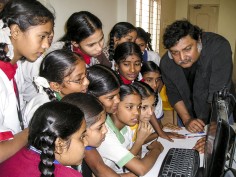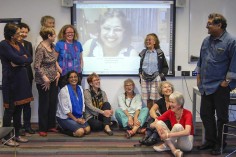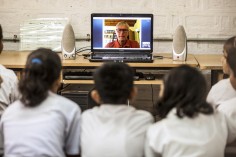
School in the Cloud: a TED prize winner's quest to transform education

Sugata Mitra is a polymath who has studied energy storage systems, designed batteries and worked on computer networking. But for the past 15 years, he has been preoccupied with educational research. His radical ideas about self-organised learning won him the TED prize in 2013, which gave him US$1 million to realise his vision for a global "School in the Cloud".
This builds on Mitra's discovery that given access to the wealth of information available on the web, children can learn a great deal on their own. The idea is to create a platform that links learning "labs", where youngsters, poor and rich, can work together on questions designed to spark their curiosity in different areas and lead them to think critically.
Mitra's experiments in education began in 1999, when he was chief scientist at the National Institute of Information Technology in New Delhi and feeling particularly frustrated that poor Indian children had no access to computers.
"The fact that rich children had computers, but the poor could not afford them was kind of annoying. I thought, let's at least give one computer to a group of poor kids and see what they do with it," the 62-year-old says.
Mitra installed a computer with an internet connection in a hole in a wall near a slum in south Delhi, and filmed youngsters' response through a hidden camera.

Inquisitive street children soon spotted it and figured out on their own not only how to use the device but also to use it to surf the internet. His hunch - that curious children are driven to explore, discover and share their learning with each other - was confirmed.
The experiment showed that children could learn collaboratively using the internet, even without direct input from a teacher, as long as there was an environment that could stimulate exploration - a form of what Mitra calls "minimally invasive education".
The striking results propelled him to continue investigations into how people learn. In 2006, the work garnered Mitra a grant from Newcastle University in northeast England to develop his ideas into practical ways to improve education in India.
Later appointed professor of educational technology at Newcastle, Mitra has built a series of learning labs in India and Britain called Self Organised Learning Environments, or Soles, where children can embark on these intellectual adventures online.
Tapping into his School in the Cloud website, schools from Brazil to South Africa have since set up Soles using a toolkit that sets out how educators can launch students on a journey of discovery by posing questions such as, "Why are there no animals bigger than a blue whale?" instead of "What is the biggest animal in the world?"
At the Futian Education Bureau in China, Huang Liang has been running a trial Sole project that she hopes will spread across the district.

Newcastle University is talking to Liu Qiang, an associate professor at the Institute of International and Comparative Education at Beijing Normal University, who wants to start a pilot programme in three government schools.
The effect of Mitra's approach can be seen at a girls' school in the Delhi suburb of Kalkaji, where students engaged in a Sole session are clearly in charge. A coordinator is on hand in case they need help, but the girls, aged between eight and 10, are directing several lines of investigation that have been posed to them: Why does the earth go round the sun? Why do humans walk on two legs? Could robots replace humans? What would happen if all insects in the world died?
Such questions lead students on journeys of discovery that often link several subjects and for which there may not be easy answers. But in the process, "what they research is far more advanced than what is expected of them in their school curriculum", says Ritu Dangwal, Sole coordinator at the school.
More recently, Mitra has introduced a feature for Soles in India called the Granny Cloud. The idea came after he asked a group of poor Indian children what they might use Skype for; they wished they could have a grandmother in England to read them stories.
Now a network of 75 volunteers - men and women across the world who are interested in working with disadvantaged kids - have signed up. It involves 30 minutes' casual conversation on Skype every day. Just as a grandparent would, they chat with the children about a range of topics. The initial effect has been a great improvement in their English comprehension and speaking skills.

The girls at the Kalkaji schools speak confidently with Louise Holley, a volunteer in Melbourne, about their different communities, sing songs and read stories.
"The most amazing effect is on their confidence," says Holley, a retired primary school teacher. "At first they are shy, scared to speak. After a few sessions, their confidence is so high they dominate the session."
Juggling schedules to ensure the grannies are available has been a challenge, but Mitra is thrilled with the results so far. Once documented and published, the findings may well prove "explosive", he says.
He had expected the experiment to improve youngsters' spoken English in a year or two. Instead, children from poor families that spoke no English were picking up the language within weeks.
"I was taken aback," he says. "They start speaking English from the third or fourth day. I asked them how they managed to speak English so quickly and I had to laugh at the answer because it was so obvious. They told me, 'What choice do we have? The granny doesn't speak Hindi'."
At several primary schools in the Australian state of Victoria, Sole converts such as Brett Millot rave about its impact on students. "Students learn that information needs to be critically analysed and evaluated in terms of the author's point of view. This capacity to discern the value of information is very much a 21st-century skill in a text-rich world … the strategy has enormous potential to be embedded in mainstream classroom programmes," says Millott, principal of Aberfeldie Primary School.
Data from the Soles and the Granny Cloud project is being collected and analysed, with the results scheduled to be published in November 2016. Meanwhile, educators from around the world have downloaded Mitra's Sole toolkit for use in classrooms.
"I had thought I would quietly work on my six or seven Soles. It doesn't happen like that in the internet world," he says. "It went viral. Teachers said we are not going to wait, we're going to do it. The last time I checked, more than 10,000 teachers across the world were blogging about it."
The last time I checked, more than 10,000 teachers across the world were blogging about it
If the programme lives up to expectations, Mitra and his team hope the Indian government will be encouraged to introduce the concept into mainstream education.
There's certainly an urgent need to reform India's education system. Last year, the independent Annual Status of Education Report on Indian rural schools found that after five years of primary education, more than 60 per cent of children were unable to read simple text at Primary Two level.
Is there one measure the Indian government could take to immediately lift standards in schools? "Yes, and it can easily be done," Mitra says, although he believes officials would not take that step - which is to allow the use of the internet in exams.
"In doing so, the whole system would have to change. The kind of questions set in exams would have to change. You can't ask, for example, simple factual questions because they would be too easy to answer."
The questions would have to be framed instead to probe students' understanding of fundamental concepts and principles. Educators would also have to teach differently, just as officials would have to rethink the school curriculum. To accommodate this new way of learning, education systems all over the world would gain depth, Mitra argues.
"I tell the Scandinavians, who are progressive in education, to let me set up one school like this. I think the results would amaze everyone," he says.
"Children who can learn off the internet can learn any time they need to, and in a very short time. They neither need to memorise, nor be examined for their ability to retain information."
Instead examinations should look for children's ability to learn and solve problems.
Still, misconceptions persist in India, where some believe Mitra's idea of a school of the future is just a fancy website.
As Mitra sees it, a school will always centre on a place; the change is in what happens in classrooms: "Delivery [of education] will change. How and what children learn will change. Assessment systems will change."
Children will be assessed on their grasp of a subject rather than retention of facts. Some Scandinavian countries are already moving in this direction and Mitra insists it is the way of the future.
If the purpose of schooling has shifted, his Sole experiments may offer clues to what might replace it. And Mitra says the learners of tomorrow will be drivers of the process rather than passive recipients.